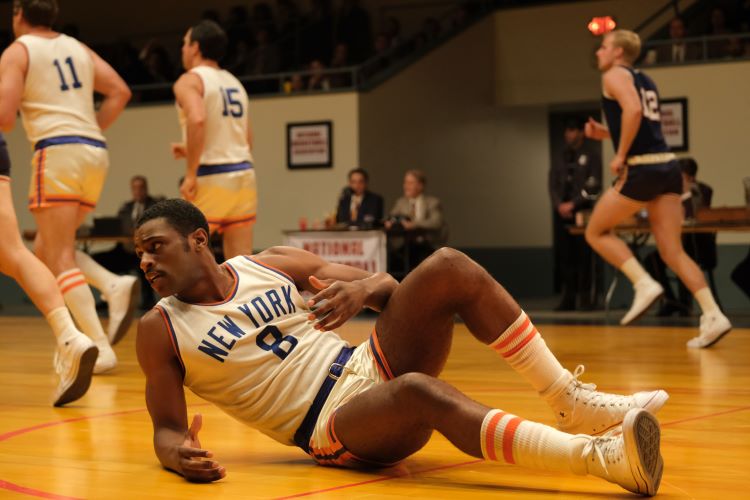
Martin Guigui’s Sweetwater begins with a sports reporter (Jim Caviezel) getting into a taxicab and start discussing the possibility of a “new guy” named Michael Jordan. The year is 1990, and the sports world is already buzzing about Jordan’s potential. The reporter doesn’t quite see what people are talking about with Jordan and starts listing off all the greats that preceded him. But, as his cab driver explains, there was another person that doesn’t get as much recognition, one who broke barriers back when racism was much more rampant.
From that opening bookend, it’s clear that Sweetwater is going to be a film that tells a true story but doesn’t deter from other great sports biopics that preceded it. While this particular genre has been following the same formula for years, there are some examples that stand out from the rest such as Rudy and Eddie the Eagle. Those are films that are inspirational and consistently carry the message to the end. Sweetwater is almost too obvious in the route it’s going to take. And, despite some uplifting moments and a few standout performances, it doesn’t do much to stand out from other sports biopics.
The film is based on the true story of Nat “Sweetwater” Clifton (portrayed by rising star Everett Osborne), and how he became the first African American to sign a contract for the NBA. Directed by Martin Guigui, the film heavily relies on sympathy for Nat during his upbringing. Flashbacks to his childhood, which mostly show him picking cotton with his parents and getting scratches from the work, are framed with this ugly vignette approach. Every time something happens to Nat’s hands as an adult, Guigui treats it like a post-traumatic stress disorder experience. It’s a phony approach to the treatment Nat received growing up.
Taking place in the late 1940s and early 1950s, Nat Clifton is a player for the Harlem Globetrotters – yes, the team that is now known for its goofy antics. Back then, they had the same approach to their games, but also played some seriously great basketball. One game that is featured has the team beating the Minnesota Lakers, who were considered the top team at the time in the Basketball Association of America (BAA) despite only being formed six months prior.
Since the Globetrotters were a black team, they weren’t allowed to participate in the league, even though they were the best basketball team in the country. They won practically every game they played, whether it was an earned win or their coach Abe Saperstein (Kevin Pollak) made a behind-the-scenes transaction to ensure one would happen.
One player who stood out amongst the crowd was Clifton, who caught the eye of New York Knicks founder Ned Irish (played by Cary Elwes) and their coach Joe Lapchick (Jeremy Piven). But during this time, black players were not allowed to play in the newly formed National Basketball Association.
An agreement is eventually made with Clifton, Irish, and Lapchick – which then leads to encounters of racism and how black players shouldn’t play on white teams. One scene has Eric Roberts making a cameo as a racist gas station owner that is more comical than convincing.
Guigui’s attention to the in-game action makes the film exciting to watch during these moments. The games are shot well, and even non-basketball fans may find some enjoyment in watching these scenes play out. But when he puts his focus on the more hard-hitting messages of racism, segregation, and acceptance, the messaging almost becomes too forced and showy. Nat smashes a sign that is discriminatory toward blacks in a restaurant, after he is denied service. When Nat makes his NBA debut, there’s a slight hesitation as he crosses the line from benchwarmer to player – accompanied by an overbearing score crafted by Guigui and Jeff Cardoni.
There are certain historical moments that occurred during this time that formed the NBA into what it is today, such as the invention of the three-pointer and dunk. But Guigui presents them in such a hokey approach that it detracts from the importance of those moments.
Sweetwater isn’t without its highlights, though. As previously mentioned, the in-game action is fun to watch, and Osborne – in his lead performance debut – brings a certain level of grace to his portrayal as Clifton. A former college basketball player himself, Osborne moves with style and brings a nice charm to the role.
Elwes and Piven work well together as the Knickerbockers founder and coach, respectively. Pollak, who’s usually a pretty solid performer and great comedian, is given some of the worst dialogue in the film. There’s even one moment in which he describes himself as “the Jewish Abe Lincoln” that is extremely tone-deaf and cringeworthy. Then there’s Richard Dreyfuss as Maurice Podoloff, the initial president of the NBA, who isn’t given much to work with.
While Nat Clifton’s story is important to know, Sweetwater isn’t the film that does it justice. Cliches can be forgiven from time to time, but the approach to telling the story is what matters the most when trying to stand out in this genre. Guigui and team take the easy route and end up giving us a film that is more cheesy than uplifting.
Sweetwater releases to theaters on April 14 from Briarcliff Entertainment.